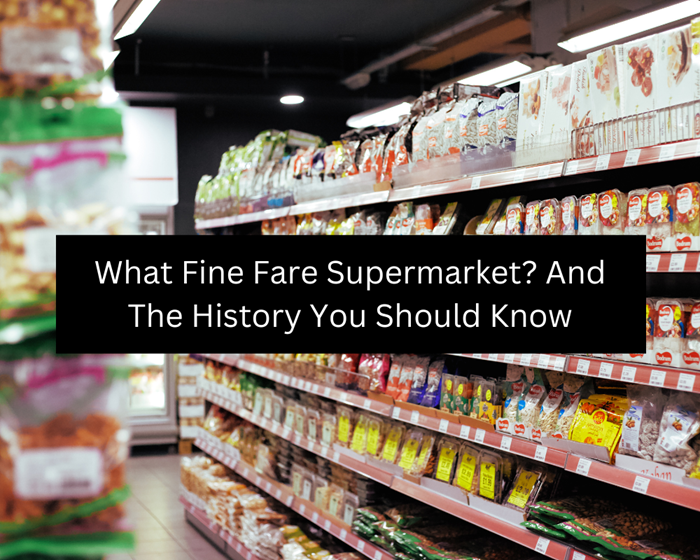
What is Fine Fare Supermarket? And The History You Should Know
Do you need to learn about fine fare supermarket? This can be a one-stop solution if you need the perfect place to get the history of fine fare supermarkets. Fine Fare was a supermarket chain operating throughout the United Kingdom from 1951 until 1988. Their Yellow Pack budget own-label line was among the first budget own-brand ranges ever introduced in Britain in 1980, and in 1983, it became the first retailer offering organic food sales. Gateway Foodmarkets took over ownership in mid-1980. Let’s get deep into the history of Fine Fare supermarkets in this article, so stay tuned to learn the interesting facts about Finefare.
History of fine fare supermarkets
Howardsgate Holdings was formed as an individual grocery store located in Welwyn Garden City in 1951 as an offshoot of Welwyn Department Store operated by Ebenezer Howard, the leader of the Garden City movement. fine fare became part of three convenience stores set up during the 1950s, with Premier and Victor Value as its peers. In January 1959, the fine fare won a court appeal with Brighton Corporation over their assertion that fine fare shops closed Wednesday afternoons after lunch by the Shops Act 1950. By 1962, they had grown into over 200 locations.
Fine fare supermarket was acquired from Associated British Foods (ABF) in 1963 when James Gulliver became its chairman; ABF then appointed him until 1972, when Fine fare supermarket sales rose from PS75 million to PS200 million following their purchase from ABF. Fine fare supermarket bought 47 stores from East Anglian supermarket chain Downsway, which was run by Union International Group – owned and run by Vestey family-owned Union International Group – in 1974. Other chains acquired included Burton Supermarkets of Nottingham (NOT), Elmos of East Anglian origin, Mercury Market of North West UK and Coopers (founded 1955).
Fine fare supermarket was commonly reported as having a third market share behind Tesco and Sainsbury’s. Additionally, this company ran stores nationwide under various banners such as Melias and Shoppers Paradise convenience and discount food stores, respectively, along with Fix and Fit stores (sold to WHSmith Do It All later that same year) that offered DIY supplies and Fix and Fit stores (which later on sold to WHSmith Do It All in 1986). Furthermore, in 1983, Fine Fare became Britain’s first grocery store carrying organic products
In June 1986, ABF sold their company to The Dee Corporation (later Somerfield). Subsequently, all newly acquired stores by The Dee Corporation either became Gateway Foodmarkets or closed entirely; consequently, the FineFare name (including Shoppers Paradise and Melias ) disappeared by the 1980s. Fine fare supermarket was proud to sponsor the Scottish Football League from 1985-1986 (beginning August 1985) to 1988 (1988, when all Fine Fare stores closed). Television commercials featuring actor Gordon Jackson for Fine Fare stores also promoted them.
Location and the things you can buy in fine fare supermarket
Fine Fare Supermarket operates 60 branches throughout New York, New Jersey, and Pennsylvania with milk, produce, meat, fish, and deli, as well as bakery and produce departments. Two street-front commercial spaces on 50 Penn were acquired through the East New York Retail Preservation Program to protect existing East New York businesses within its confines by offering rental rates that allow retailers to attract employees while recruiting them into East New York neighbourhoods and providing job training and benefits. One space on 50 Penn was even home to the District 27 NYC Councilmember’s Office as well as an outlet store!
Read: Sustainability Efforts in the US Jewelry Manufacturing Industry
Want to work with a fine fare supermarket?
Jobs at fine fare supermarkets allow you to gain experience working within this renowned concept in grocery stores. There are various openings with fine-fare supermarkets where you could apply quickly for employment opportunities. Questions may also arise regarding how difficult it is to secure employment at Fine Fare Supermarket. According to reports, interviews at fine fare supermarket are straightforward and can take less than an hour from start to finish. Survey participants have positively rated most interview experiences. How does fine fare supermarket hire people? Interviewing generally lasted an hour; the overall interview experience was favourable. Regarding COVID-19 compliance at fine fare supermarket, 71% of survey participants felt their management responded satisfactorily to COVID-19 regulation compliance.
Conclusion
In conclusion fine fare supermarket is an great chain business where you can also work and add good experience in your life. About the history and more things such as the locations and the kinds of things you can buy from fine fare supermarkets. Below are some questions that will help you add more information to your search.
FAQ
Was there a supermarket called Fine Fare?
Fine Fare was a chain of grocery stores that operated in the United Kingdom from 1951 until 1988. Their Yellow Pack budget range of own-label products was introduced in 1980. Finefare was the first brand owned by itself, and its fundamental ranges were introduced in the UK in 1983. It was the first store to offer organic products.
Is Fine Fare Supermarkjet a franchise?
Yes. FineFare Supermarket’s franchise network spans New York, New Jersey, and Pennsylvania, with over 60 stores providing milk, produce meats, fish, and deli and bakery services.
What happened to Fine Fare supermarket?
In June 1986, Associated British Foods sold its Fine Fare brand to The Dee Corporation, later renamed Somerfield. Most FineFare supermarkets were either rebranded Gateway or closed down entirely, meaning by the end of the 1980s, The FineFare name had disappeared from our streets.
Which is the oldest supermarket in India?
Kolkata’s Super Bazar was established in 1966 following the Indo-Pak war as a way to curtail price increases through affordable products, including oil and vegetables, as well as electronics like transistors and computers.
What is the difference between a grocery supermarket and a hypermarket?
Supermarkets tend to be larger than department stores or convenience stores, with larger spaces and better selection. Hypermarkets tend to offer an even more incredible selection than their grocery counterparts, as well as spas, cafes, eateries, etc. (27 October 2023)


